The Future of Agile: Trends and Challenges
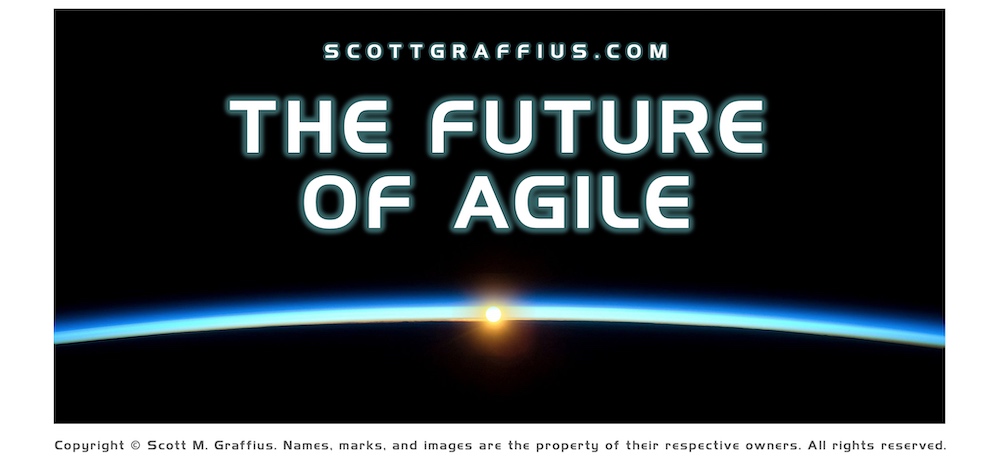
Click here to download this article as a PDF.
A Brief Overview of Agile
Organizations are increasingly adopting Agile approaches — such as Scrum, Kanban, SAFe, and others — to develop products and services. Some of the top reasons are:
- Flexibility: Agile approaches prioritize flexibility and the ability to adapt to changing requirements and circumstances easily. That’s advantageous in today's fast-paced business environment.
- Faster Time-to-Market: Agile approaches emphasize quick delivery of working products or services, which enables businesses to rapidly respond to market demands and gain a competitive edge.
- Customer-centric: Agile approaches focus on delivering value to customers, which helps businesses to better understand their needs and deliver products or services that meet those needs.
- Collaboration: Agile approaches encourage collaboration and communication between team members, which helps to create a more cohesive and productive team.
- Continuous improvement: Agile approaches prioritize continuous improvement, allowing teams to reflect on their performance and adjust their approach as needed to improve productivity and efficiency.
The Future of Agile
As technology advances and business environments become more complex, Agile remains a powerful approach for organizations to stay competitive and deliver value to their customers. This article explores trends shaping the future of Agile and the key factors that contribute to its success.
Scaling Agile
One of the key trends shaping the future of Agile is scaling. Many organizations are looking for ways to scale Agile across teams, departments, and even the entire organization. Doing so involves adopting frameworks like the Scaled Agile Framework (SAFe), Large-Scale Scrum (LeSS), Disciplined Agile (DA), and others to coordinate and align multiple Agile teams to achieve common goals. Scaling Agile is essential to ensure that Agile practices are consistent across the organization, and that teams are working towards the same objectives.
Agile and DevOps
DevOps is another trend shaping the future of Agile. DevOps is a natural extension of Agile principles and values. DevOps aims to integrate development and operations teams to improve collaboration, streamline processes, and accelerate software delivery. As organizations increasingly embrace DevOps, Agile teams will need to incorporate DevOps practices into their workflow. This means that Agile teams will need to work more closely with operations teams and adopt new tools and practices to manage infrastructure and deployment.
Agile for Non-Tech Projects
Agile approaches were initially developed for software development projects. However, Agile principles and values can be applied to non-tech projects as well, such as marketing, HR, and finance. As organizations look for ways to improve their processes and adapt to change quickly, Agile will continue to gain traction in non-tech areas.
Agile with AI
Artificial intelligence (AI) is transforming the way businesses operate. Agile teams can leverage AI tools and techniques to improve software quality, automate testing, and optimize project management. As AI continues to evolve, Agile teams will need to adapt their processes and practices to best incorporate AI. Agile teams will need to work closely with data scientists and machine learning experts to identify opportunities to use AI in their projects.
Agile for Remote Teams
The COVID-19 pandemic has accelerated the trend of remote work. Agile teams need to adapt their processes to work effectively in a remote environment. This includes adopting new collaboration tools, establishing clear communication channels, and adapting Agile events (previously referred to as ceremonies) to work in a virtual setting.
Conclusion
The future of Agile is bright. Organizations are increasingly adopting Agile approaches to the development of products and services. By embracing trends — such as Scaling Agile, Agile and DevOps, Agile for non-tech, Agile with AI, and Agile for remote teams — and advances in technology, organizations can improve their Agile implementations and competitive advantage.



About Scott M. Graffius

Scott M. Graffius, PMP, CSP-SM, CSP-PO, CSM, CSPO, SFE, ITIL, LSSGB is an agile project management practitioner, consultant, multi award-winning author, and highly sought-after international keynote speaker. He has generated over $1.75 billion of business value in aggregate for the organizations he has served. Graffius is the CEO and Principal Consultant at Exceptional PPM and PMO Solutions™ and subsidiary Exceptional Agility™. Content from his books, talks, workshops, and more have been featured and used by businesses, professional associations, governments, and universities. Select examples include Microsoft, Oracle, Broadcom, Cisco, Gartner, Project Management Institute, IEEE, U.S. Soccer Federation, Qantas, National Academy of Sciences, U.S. Department of Energy, U.S. National Park Service, New Zealand Ministry of Education, Yale University, Warsaw University of Technology, and others. Graffius has delighted audiences with dynamic and engaging talks and workshops on agile, project management, and technology leadership at 82 conferences and other events across 24 countries.
His full bio is available here.
Connect with Scott on:
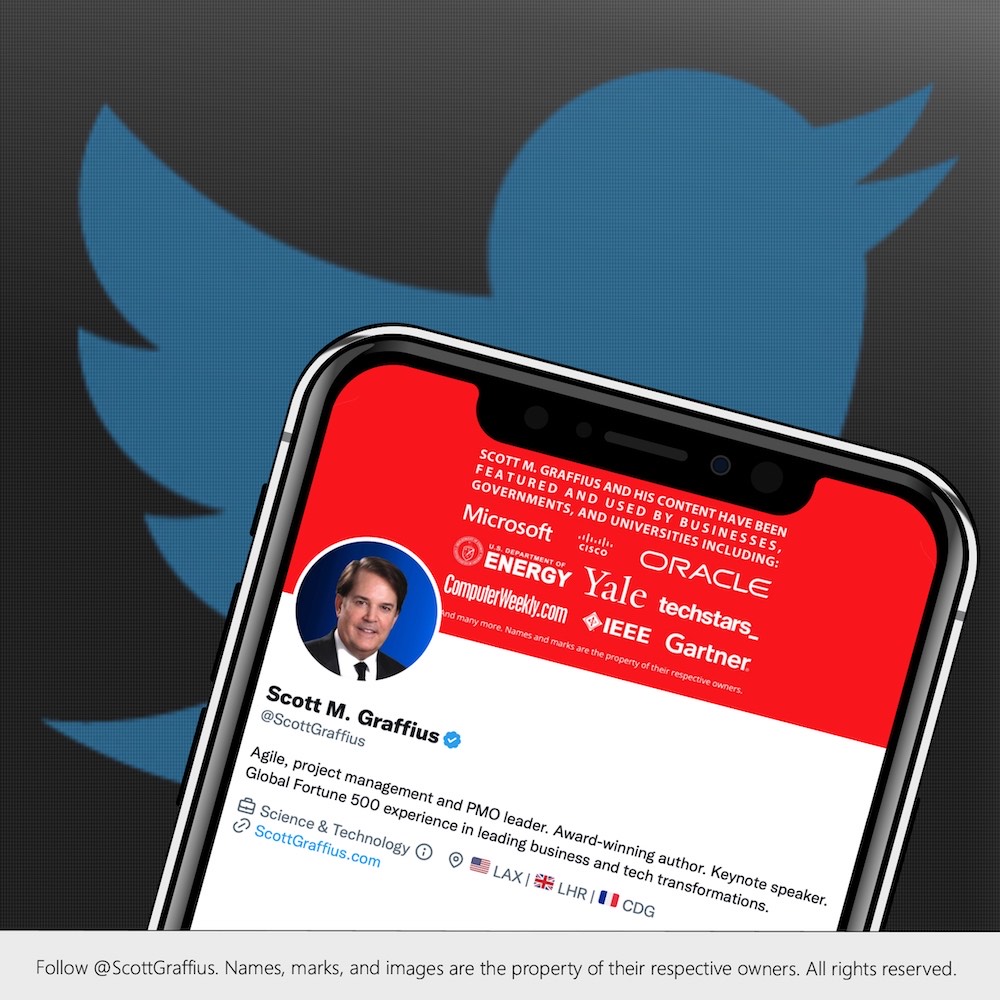

About Agile Scrum: Your Quick Start Guide with Step-by-Step Instructions
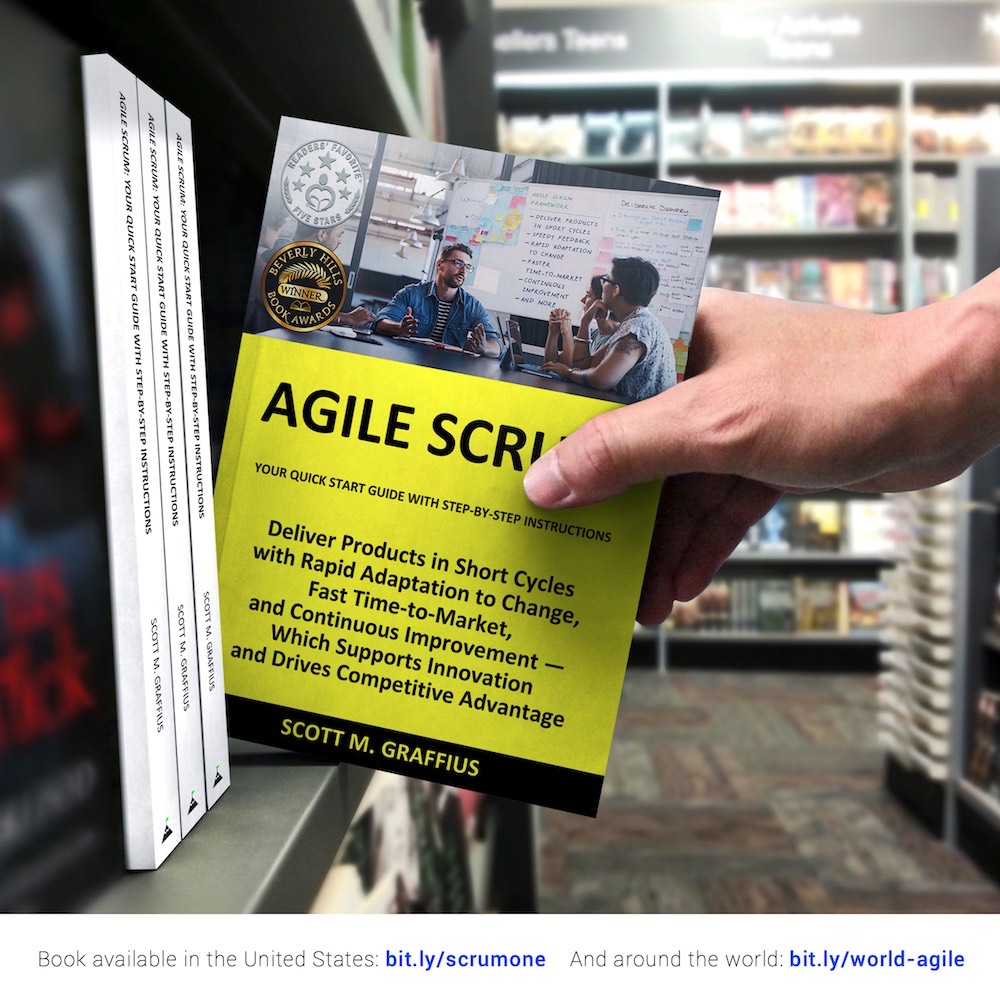
Shifting customer needs are common in today's marketplace. Businesses must be adaptive and responsive to change while delivering an exceptional customer experience to be competitive.
There are a variety of frameworks supporting the development of products and services, and most approaches fall into one of two broad categories: traditional or agile. Traditional practices such as waterfall engage sequential development, while agile involves iterative and incremental deliverables. Organizations are increasingly embracing agile to manage projects, and best meet their business needs of rapid response to change, fast delivery speed, and more.
With clear and easy to follow instructions, the multi award-winning Agile Scrum: Your Quick Start Guide with Step-by-Step Instructions book by Scott M. Graffius (Chris Hare and Colin Giffen, Technical Editors) helps the reader:
- Implement and use the most popular agile framework―Scrum;
- Deliver products in short cycles with rapid adaptation to change, fast time-to-market, and continuous improvement; and
- Support innovation and drive competitive advantage.
Hailed by Literary Titan as “the book highlights the versatility of Scrum beautifully.”
Winner of 17 first place awards.
Agile Scrum: Your Quick Start Guide with Step-by-Step Instructions is available in paperback and ebook/Kindle in the United States and around the world. Some links by country follow.
- 🇧🇷 Brazil
- 🇨🇦 Canada
- 🇨🇿 Czech Republic
- 🇩🇰 Denmark
- 🇫🇮 Finland
- 🇫🇷 France
- 🇩🇪 Germany
- 🇬🇷 Greece
- 🇭🇺 Hungary
- 🇮🇳 India
- 🇮🇪 Ireland
- 🇮🇱 Israel
- 🇮🇹 Italy
- 🇯🇵 Japan
- 🇱🇺 Luxembourg
- 🇲🇽 Mexico
- 🇳🇱 Netherlands
- 🇳🇿 New Zealand
- 🇳🇴 Norway
- 🇪🇸 Spain
- 🇸🇪 Sweden
- 🇨🇭 Switzerland
- 🇦🇪 UAE
- 🇬🇧 United Kingdom
- 🇺🇸 United States

About Agile Transformation: A Brief Story of How an Entertainment Company Developed New Capabilities and Unlocked Business Agility to Thrive in an Era of Rapid Change
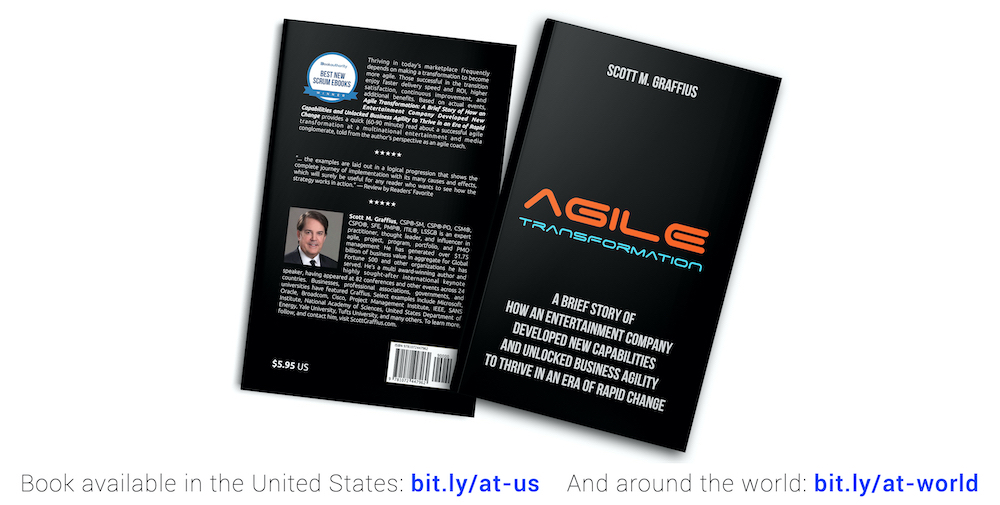
Thriving in today's marketplace frequently depends on making a transformation to become more agile. Those successful in the transition enjoy faster delivery speed and ROI, higher satisfaction, continuous improvement, and additional benefits.
Based on actual events, Agile Transformation: A Brief Story of How an Entertainment Company Developed New Capabilities and Unlocked Business Agility to Thrive in an Era of Rapid Change provides a quick (60-90 minute) read about a successful agile transformation at a multinational entertainment and media company, told from the author's perspective as an agile coach.
The award-winning book by Scott M. Graffius is available in paperback and ebook/Kindle in the United States and around the world. Some links by country follow.
- 🇦🇺 Australia
- 🇦🇹 Austria
- 🇧🇷 Brazil
- 🇨🇦 Canada
- 🇨🇿 Czech Republic
- 🇩🇰 Denmark
- 🇫🇮 Finland
- 🇫🇷 France
- 🇩🇪 Germany
- 🇬🇷 Greece
- 🇮🇳 India
- 🇮🇪 Ireland
- 🇯🇵 Japan
- 🇱🇺 Luxembourg
- 🇲🇽 Mexico
- 🇳🇱 Netherlands
- 🇳🇿 New Zealand
- 🇪🇸 Spain
- 🇸🇪 Sweden
- 🇨🇭 Switzerland
- 🇦🇪 United Arab Emirates
- 🇬🇧 United Kingdom
- 🇺🇸 United States

The short URL for this article is: https://bit.ly/agile-future
© Copyright 2023 Scott M. Graffius. All rights reserved. This material may not be published, broadcast, rewritten or redistributed without the express written permission of Scott M. Graffius.

AI is a Team Sport: A Confluence of Diverse Technical and Soft Skills are Crucial for Success

Select here to download this article as a PDF.
This article covers the significance of well-rounded AI teams, including how both soft and technical skills are critical and fuel success. It’s informed by Graffius' work on AI projects as well as research and coverage from DARPA, Exceptional Agility, IBM, IEEE, Intel, MIT, Microsoft, Nvidia, Samsung, Software Engineering Institute, Stanford University, United States Artificial Intelligence Institute, and others (all listed in the bibliography section of this article).

Introduction
Artificial Intelligence (AI) has emerged as a transformative force across a growing number of industries, revolutionizing how we live, work, and interact. From autonomous vehicles and virtual assistants to personalized recommendations and medical diagnoses, AI systems have become integral to our daily lives. Behind these cutting-edge, life-changing solutions are AI teams that possess a combination of soft skills—also known as core skills, interpersonal skills, people skills, power skills, transferable skills, or transversal skills—and technical expertise.
This article highlights the synergy between soft skills and technical skills in the world of AI. While technical skills provide the general foundation for AI development, it’s the soft skills that elevate AI projects to new heights. From effective communication and critical thinking to leadership and teamwork, soft skills play a pivotal role in translating technical knowledge and capabilities into real-world applications.
The thesis of this article is that the successful development and application of AI requires a combination of soft skills and technical expertise. Technical competencies alone are not enough. Rather, it’s the combination and integration of soft and technical skills that truly unlocks the power of AI.
Next, this article focuses on the importance of soft skills in the AI landscape, highlighting how they complement and enhance technical abilities. The collaboration between these skill sets drives AI innovation.

Understanding Soft Skills in AI Teams
In the realm of AI, technical expertise often takes center stage. However, soft skills advance the successful outcomes of AI projects, as they facilitate effective communication, foster collaboration, and promote critical thinking. Soft skills are powerful facilitators of success.
Soft skills encompass a range of interpersonal and cognitive abilities that enable teams to work harmoniously, adapt to evolving challenges, and solve complex problems. In the AI landscape, where multidisciplinary teams come together to create innovative solutions, these soft skills are essential.
Effective communication stands at the forefront of soft skills in AI. AI teams must articulate complex technical concepts in a manner that is understandable to diverse stakeholders, including non-technical staff and internal or external customers/users. Clear communication promotes collaboration and ensures alignment of purpose and objectives throughout the AI development lifecycle.
Soft skills such as problem-solving and critical thinking are vital as well. AI teams frequently encounter multifaceted challenges, and it is through these soft skills that teams can identify potential bottlenecks, navigate complexities, and devise innovative solutions. By leveraging critical thinking, AI team members can evaluate different approaches, consider ethical implications, and make informed decisions that shape the development and application of AI systems.
Leadership and teamwork skills are also paramount. AI projects involve team members from diverse backgrounds, including data scientists, engineers, domain experts, designers, and others. Effective leadership enables the coordination of efforts and guides the project towards success. Similarly, teamwork skills foster an environment of trust and respect, promoting synergy among team members and enhancing overall productivity.
Recognizing the importance of soft skills in AI is crucial for fostering a balanced and effective team dynamic. It ensures that AI teams possess the interpersonal and cognitive abilities necessary to bring AI projects to fruition. The integration of soft skills alongside technical expertise sets the stage for a cohesive team capable of tackling complex AI challenges with agility and innovation.
The role of technical skills—including how they intersect with soft skills to create a powerful combination that drives success—are covered next.
The Role of Technical Skills in AI Teams
Technical skills provide the tools and knowledge required to design, build, and implement AI systems. This section explores the role that technical skills play in AI and their specific applications in various stages of AI projects.
- Programming Languages and Algorithms: Proficiency in programming languages such as Python, Java, or R is essential. These languages enable team members to write efficient code, manipulate and analyze data, and implement machine learning algorithms. Understanding algorithms, from classic ones like linear regression to cutting-edge deep learning models, empowers AI professionals to leverage mathematical principles and statistical techniques to train and optimize AI systems.
- Data Analysis and Management: AI relies on data, making data analysis and management skills crucial. AI team members need to be adept at collecting, cleaning, and preprocessing data, ensuring its quality and relevance. They must possess the knowledge of statistical methods, data visualization techniques, and data engineering practices to extract insights from complex datasets and prepare them for AI model training.
- Machine Learning and Neural Networks: Technical skills in machine learning are at the heart of AI systems. Understanding machine learning algorithms, such as decision trees, support vector machines, or convolutional neural networks, enables AI team members to create models that can learn from data and make intelligent predictions or decisions. Expertise in neural networks and deep learning architectures equips professionals with the ability to develop complex models capable of handling tasks like image recognition, natural language processing, and reinforcement learning.
- AI Frameworks and Tools: Proficiency in AI frameworks and tools (such as TensorFlow, Keras, PyTorch, Caffe, Scikit-learn, and others) are essential for building AI systems efficiently. These frameworks provide pre-built modules, libraries, and APIs that simplify the implementation of AI algorithms and models. Technical skills in utilizing these tools effectively enable AI team members to accelerate the development process, streamline model training, and optimize system performance.
- Domain Knowledge and Application-Specific Skills: Technical skills also encompass domain knowledge and application-specific expertise. Understanding the nuances of the industry or problem domain in which AI is being applied allows professionals to tailor AI solutions to meet specific requirements. For example, healthcare-focused AI projects may require knowledge of medical terminologies and regulatory considerations, while AI solutions for financial services may demand expertise in risk assessment and fraud detection.
Technical skills are essential for AI projects. They enable team members to translate concepts, theories, and algorithms into practical applications. However, technical skills alone are not sufficient for success. The collaborative nature of AI development and the need for a well-rounded AI team—including the synergy between technical skills and soft skills—is covered next.
The Power of Synergy: Soft Skills and Technical Skills in AI Teams
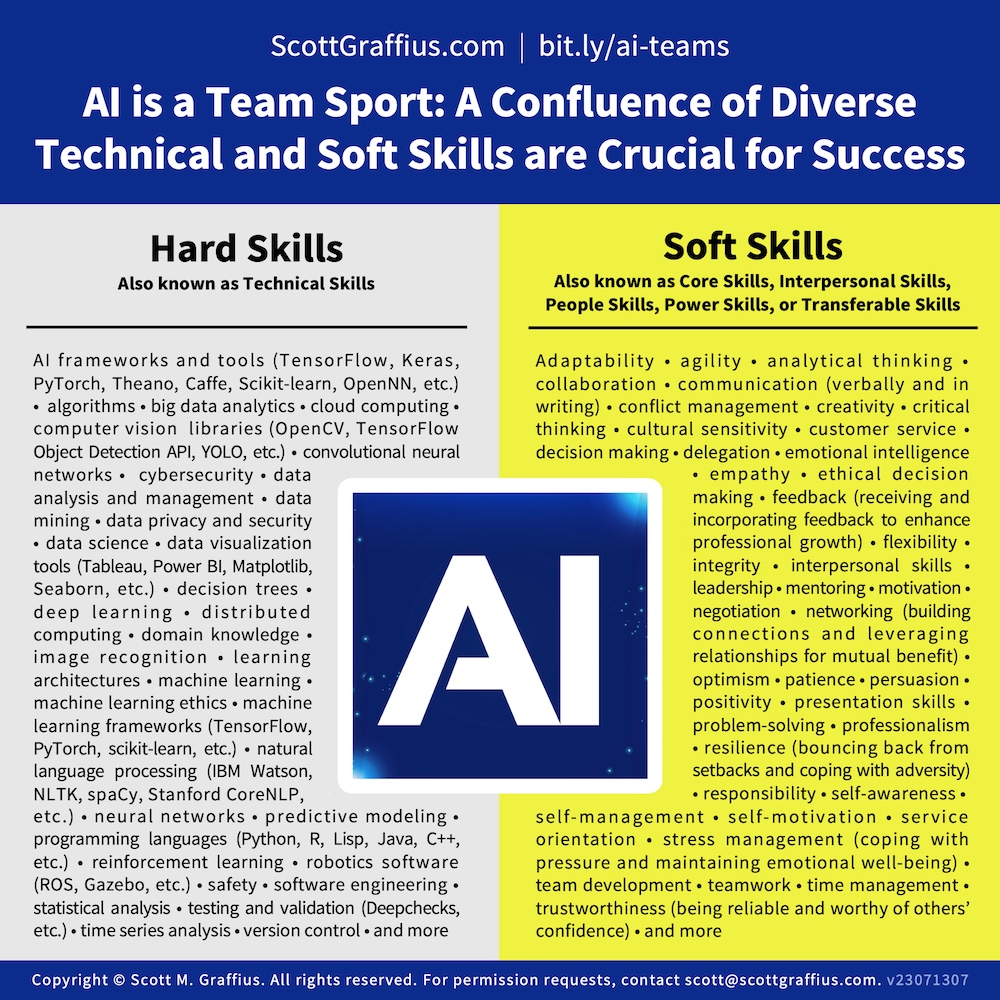
The convergence of technical and soft skills is where true innovation and breakthroughs occur. The successful development and application of AI systems rely not only on technical expertise but also on the harmonious integration of soft skills. Here’s some examples of the power of synergy between these skill sets, including how they work together to drive AI advancement:
- Effective Communication and Technical Expertise: Communication bridges the gap between AI professionals and others who may not possess technical backgrounds. AI experts with strong communication skills can articulate complex technical concepts in plain English, ensuring that everyone involved understands the goals, challenges, and progress of the project. By effectively conveying ideas, AI professionals foster collaboration, gather valuable insights, and create a shared vision for AI initiatives.
- Collaboration and Problem-Solving: Collaboration is at the core of AI development, and soft skills such as teamwork, empathy, and active listening facilitate effective collaboration among diverse team members. AI teams with strong collaboration skills can effectively pool their technical expertise, brainstorm ideas, and solve complex problems together. By leveraging their collective intelligence and diverse perspectives, AI teams can overcome challenges, refine AI models, and optimize the performance of AI solutions.
- Critical Thinking and Technical Innovation: Critical thinking, coupled with technical expertise, leads to innovative AI solutions. AI professionals with strong critical thinking skills can evaluate different approaches, challenge assumptions, and identify potential shortcomings or biases in AI models. They can think creatively to address issues such as data biases or fairness concerns, ensuring that AI systems are developed responsibly and ethically.
- Leadership and Team Empowerment: Effective leadership in AI projects involves establishing and maintaining a collaborative and inclusive environment, empowering team members, and harnessing their full potential. AI leaders with exceptional interpersonal abilities can inspire and motivate their team, foster a culture of continuous learning, and provide guidance in navigating complex technical challenges. They encourage interdisciplinary collaboration, respect diverse perspectives, and drive the team towards achieving AI objectives.
The synergy between soft skills and technical skills is the catalyst that drives AI projects towards success. It enables AI teams to go beyond technical expertise and develop AI systems that address real-world problems effectively. By embracing a holistic approach that values both soft skills and technical skills, organizations can foster an environment where AI thrives, resulting in innovative solutions that have a positive impact on society.
Strategies for developing and nurturing soft skills are covered next.
Developing and Advancing Soft Skills in AI Teams
AI teams need soft skills to be successful. Organizations and teams should prioritize the development and advancement of these skills. Here are some strategies to enhance soft skills and foster a well-rounded AI workforce:
- Training Programs and Workshops: Implement specialized training programs and workshops focused on enhancing soft skills. Offer courses in effective communication, leadership (including how to navigate the phases of team development), problem-solving, critical thinking, and collaboration. These programs can provide AI professionals with the necessary tools and techniques to effectively apply soft skills in their work.
- Interdisciplinary Collaboration and Knowledge Sharing: Encourage interdisciplinary collaboration by creating opportunities for AI team members to work alongside experts from diverse fields such as psychology, design, ethics, and business. This collaboration allows for cross-pollination of ideas, encourages different perspectives, and broadens the skill set of AI teams. Foster a culture of knowledge sharing, where professionals can learn from each other and leverage their collective experiences and expertise.
- Real-World Project Engagement: Provide AI team members with opportunities to work on (other) real-world projects, allowing them to apply their soft skills in practical scenarios. Engaging in projects that involve interaction with clients, end-users, and stakeholders helps AI team members develop effective communication, problem-solving, and teamwork skills.
- Continuous Learning and Professional Development: Encourage AI team members to engage in continuous learning and professional development activities. This can include attending conferences, participating in webinars, reading industry publications, and pursuing certifications in relevant areas. Promote a growth mindset among AI team members, emphasizing the importance of lifelong learning and staying current with the latest developments in both technical and soft skills domains.
- Mentorship and Coaching: Establish mentorship and coaching programs where experienced AI professionals guide and support individuals with less experience. Mentors can provide valuable insights, share their experiences, and offer guidance on developing skills. Regular feedback and coaching sessions help AI professionals identify areas for improvement and provide targeted development opportunities.
By implementing these strategies, organizations can cultivate a workforce that excels not only in technical skills but also in the essential soft skills required for AI success. Nurturing well-rounded AI professionals creates a collaborative and adaptive environment, where AI teams can effectively address complex challenges, drive innovation, and deliver impactful solutions.
The next section wraps up this exploration.
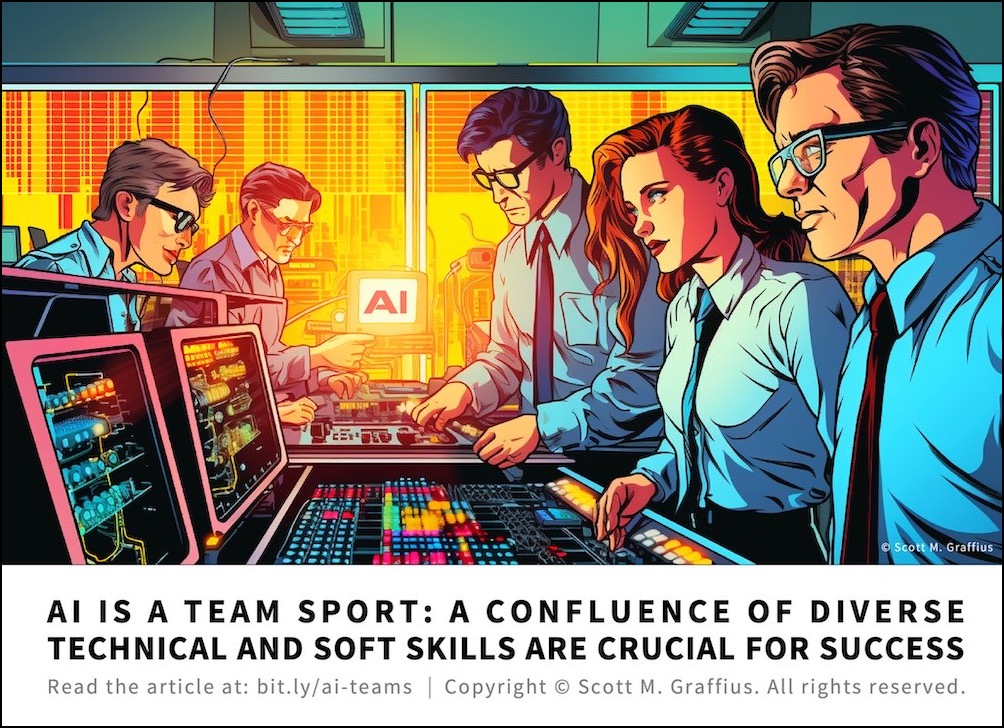

Conclusion
The successful development and application of AI systems rely on the synergy between soft skills and technical skills. While technical expertise forms the foundation, it's the integration of soft skills that elevates AI projects to new heights. Effective communication, collaboration, critical thinking, and leadership are among the key soft skills that enable AI teams to excel.
This article explored the significance of soft skills in AI, emphasizing their role in fostering effective teamwork, problem-solving, and innovation. It also acknowledged the indispensable role of technical skills in AI development, including programming languages, algorithms, data analysis, domain knowledge, and more.
Organizations can create well-rounded AI teams with a holistic set of abilities by embracing the power of synergy between soft skills and technical skills. AI team members with strong soft skills can effectively communicate their ideas, collaborate seamlessly, think critically, and provide leadership that empowers their teams.
To advance soft skills among AI professionals, organizations should invest in training programs, promote interdisciplinary collaboration, encourage continuous learning, and foster mentorship and coaching relationships. These efforts will help AI professionals develop the interpersonal and cognitive abilities necessary to thrive in the dynamic and collaborative AI landscape.
AI is a team sport that thrives on the confluence of soft skills and technical skills. By recognizing and embracing this synergy, organizations can unlock the full potential of AI, delivering innovative solutions that address real-world challenges and have a positive impact on the world.

References/Sources
All of the supplied links were functional when this article was published.
- Accenture (2023, March 30). Accenture Technology Vision 2023: Generative AI to Usher in a Bold New Future for Business, Merging Physical and Digital Worlds. Available at: https://newsroom.accenture.com/news/accenture-technology-vision-2023-generative-ai-to-usher-in-a-bold-new-future-for-business-merging-physical-and-digital-worlds.htm.
- Alsever, Jennifer (2020, January 20). Medicine by Machine: Is A.I. the Cure for the World’s Ailing Drug Industry? Fortune. Available at: https://fortune.com/longform/ai-artificial-intelligence-medicine-healthcare-pharmaceutical-industry.
- Anthropic (2023, March 14). Introducing Claude. Available at: https://www.anthropic.com/news/introducing-claude.
- Berlin School of Business and Innovation (2022, September 22). How Do Technical Abilities Combined with Leadership Skills Fuel Career Growth? Available at: https://www.berlinsbi.com/blog/career-advice/how-do-technical-abilities-combined-with-leadership-skills-fuel-career-growth.
- Bhatti, Shawaiz, Demir, Mustafa, Cooke, Nancy J., & Johnson, Craig J. (2021). Assessing Communication and Trust in an AI Teammate in a Dynamic Task Environment. In: 2021 IEEE 2nd International Conference on Human-Machine Systems (ICHMS): 1–6. DOI: 10.1109/ICHMS53169.2021.9582626.
- Brooks, David (2023, February 2). In the Age of A.I., Major in Being Human. The New York Times. Available at: https://www.nytimes.com/2023/02/02/opinion/ai-human-education.html.
- C3.ai (n.d.). Best Practices in Prototyping: Cross-Functional Teams. Available at: https://c3.ai/introduction-what-is-machine-learning/cross-functional-teams/.
- Crampton, Natasha (2021, January 19). The Building Blocks of Microsoft’s Responsible AI Program. Microsoft. Available at: https://blogs.microsoft.com/on-the-issues/2021/01/19/microsoft-responsible-ai-program.
- Dolev, Niva, & Itzkovich, Yariv (2020). In the AI Era, Soft Skills are the New Hard Skills. In: Artificial Intelligence and Its Impact on Business, pp. 55-77. Charlotte, NC: Information Age Publishing.
- Dzombak, Rachel, & Palat, Jay (2021, August 30). 5 Ways to Start Growing an AI-Ready Workforce. Pittsburgh, PA: Software Engineering Institute, Carnegie Mellon University.
- Elliott, Joshua (n.d.). Artificial Social Intelligence for Successful Teams (ASIST). Arlington, VA: Defense Advanced Research Projects Agency (DARPA).
- Exceptional Agility (2023, April 10). What's the Future of Agile? Available at: https://exceptionalagility.com/blog/files/the-future.html.
- Fountaine, Tim, McCarthy, Brian, & Saleh, Tamim (2019). Building the AI-Powered Organization. Harvard Business Review, 97 (4): 62–73.
- Gartner (2020, December 15). How to Staff Your AI Team. Available at: https://www.gartner.com/smarterwithgartner/how-to-staff-your-ai-team.
- Gong, Michelle; and Zhernov, Anton (2019, November 18). Advanced Machine Learning Helps Play Store Users Discover Personalised Apps. Google DeepMind. Available at: https://deepmind.google/discover/blog/advanced-machine-learning-helps-play-store-users-discover-personalised-apps/.
- Gorman, Austin (2023, April 27). How to Strengthen Your Soft Skills for AI and the Future of Work. Fast Company. Available at: https://www.fastcompany.com/90887540/how-to-strengthen-your-soft-skills-for-ai-and-the-future-of-work.
- GovExec Events (2020, July 1). Human Machine Team: The Intersection of Diverse Skill Sets [Video]. Defense One. Available at: https://www.youtube.com/watch?v=93wbNLKpbxg&t=1s.
- Graffius, Scott M. (2023, May 1). Fueling the Development of Innovative and Life-Changing AI Solutions [Presentation]. Talk delivered to an audience of Technology professionals (including Data Scientists, Machine Learning Engineers, Data Engineers, AI Researchers, Project Managers, Business Analysts, UX Designers, Software Developers, Cloud Architects, Data Privacy and Security Specialists, and others involved or interested in AI) at a private event in Mountain View, California, United States. Digital Object Identifier (DOI): 10.13140/RG.2.2.27956.73601. DOI link: https://dx.doi.org/10.13140/RG.2.2.27956.73601.
- Graffius, Scott M. (2023, April 26). The Science of High-Performance Teams [Presentation]. Talk delivered at the DevOps Institute’s SKILup Day 2023 Conference. Digital Object Identifier (DOI): 10.13140/RG.2.2.15888.28169. DOI link: https://dx.doi.org/10.13140/RG.2.2.15888.28169.
- Graffius, Scott M. (2023, January 9). Use the Phases of Team Development (Based on Bruce W. Tuckman's Model of Forming, Storming, Norming, Performing, and Adjourning) to Help Teams Grow and Advance: 2023 Update. Available at: https://scottgraffius.com. Digital Object Identifier (DOI): 10.13140/RG.2.2.10720.35846. DOI link: https://dx.doi.org/10.13140/RG.2.2.10720.35846.
- Graffius, Scott M. (2022, May 13). Want Happier and More Productive DevOps Teams? [Presentation]. Talk delivered at DevOpsDays Geneva, Switzerland 2022 Conference. Digital Object Identifier (DOI): 10.13140/RG.2.2.22252.85127. DOI link: https://dx.doi.org/10.13140/RG.2.2.22252.85127.
- Graffius, Scott M. (2021, October 5). Navigate the Phases of Team Development with Speed and Agility for Happier and More Productive Teams [Presentation]. Talk delivered at the Institute of Electrical and Electronics Engineers IEEE Day 2021 Conference. Digital Object Identifier (DOI): 10.13140/RG.2.2.20055.19365. DOI link: https://dx.doi.org/10.13140/RG.2.2.20055.19365.
- Graffius, Scott M. (2021, February 20). But First, the Team! [Presentation]. Talk delivered at the Brno, Czech Republic DevConf.CZ 2021 Conference. Digital Object Identifier (DOI): 10.13140/RG.2.2.29016.72964. DOI link: https://dx.doi.org/10.13140/RG.2.2.29016.72964.
- Gupta, Arun (2022). Non-Technical Skills Eat Technical Skills for Breakfast [Video]. Recording of Arun Gupta, VP and GM of the Open Ecosystem at Intel, speaking at the All Things Open Conference. Available at: https://www.youtube.com/watch?v=WNPxRBhYNU4.
- Humpton, Barbara (n.d.). The Future of Jobs. Siemens. Available at: https://www.siemens.com/us/en/company/press/siemens-stories/ceo-perspective/the-future-of-jobs.html.
- IBM (2019, September 26). Assemble the Team to Support a Data-Driven Project. Available at: https://www.ibm.com/garage/method/practices/culture/assemble-team-for-data-driven-project.
- IBM (2019). Everyday Ethics for Artificial Intelligence. Available at: https://www.ibm.com/watson/assets/duo/pdf/everydayethics.pdf.
- Institute of Electrical and Electronics Engineers (IEEE) (2021, November 8). The IEEE Global Initiative on Ethics of Autonomous and Intelligent Systems. Available at: https://standards.ieee.org/industry-connections/ec/autonomous-systems.html.
- Kenan Institute (2023, February 20). The Must-Have Skills in the Era of Artificial Intelligence: How AI’s Democratization Will Impact Workers. Available at: https://kenaninstitute.unc.edu/commentary/the-must-have-skills-in-the-era-of-artificial-intelligence-how-ais-democratization-will-impact-workers.
- Lindzon, Jared (2017, February 28). How AI is Changing the Way Companies are Organized. Fast Company. Available at: https://www.fastcompany.com/3068492/how-ai-is-changing-the-way-companies-are-organized.
- Marr, Bernard (2023, March 20). Beyond The Hype: What You Really Need to Know About AI In 2023. Forbes. Available at: https://www.forbes.com/sites/bernardmarr/2023/03/20/beyond-the-hype-what-you-really-need-to-know-about-ai-in-2023.
- Massachusetts Institute of Technology (MIT) Lincoln Laboratory (2023, January 17). Human-AI Performance Incubator. Available at: https://www.ll.mit.edu/r-d/projects/human-ai-performance-incubator.
- Massachusetts Institute of Technology (MIT) (2021, January). Cognitive Science as a New People Science for the Future of Work. Available at: https://workofthefuture.mit.edu/wp-content/uploads/2021/01/2021-Research-Brief-Polli-Kassir-Dolphin-Baker-Gabrieli.pdf.
- Massachusetts Institute of Technology (MIT) Sloan (2019, October 15). Winning With AI. MIT Sloan Management Review and Boston Consulting Group. Available at: https://sloanreview.mit.edu/projects/winning-with-ai.
- McNeese, Nathan J., Demir, Mustafa, Chiou, Erin K., & Cooke, Nancy J. (2021). Trust and Team Performance in Human–Autonomy Teaming. International Journal of Electronic Commerce, 25 (1): 51–72. DOI: 10.1080/10864415.2021.1846854.
- Mearian, Lucas (2023, February 24). Skills-Based Hiring Continues to Rise as Degree Requirements Fade. Computerworld. Available at: https://www.computerworld.com/article/3689170/skills-based-hiring-continues-to-rise-as-degree-requirements-fade.html.
- Meta (2017, October 11). Inventing the Future. Available at: https://www.meta.com/blog/quest/inventing-the-future/.
- Microsoft (2019, June 15). Is the Latest Technology the Key to Your Team’s Success, or is There Something Else? Available at: https://devblogs.microsoft.com/premier-developer/is-the-latest-technology-the-key-to-your-teams-success-or-is-there-something-else.
- New South Wales Technical and Further Education Commission (TAFE NSW) (2019). Soft vs. Hard Skills: Why Successful Australian Businesses Need Both. Ultimo, New South Wales: TAFE NSW.
- Nvidia (n.d.). Partner Innovation. Available at: https://www.nvidia.com/en-ph/self-driving-cars/partners/.
- O’Dea, Blathnaid (2023, February 17). These are the Top Skills AI and Analytics Professionals Need. Silicon Republic. Available at: https://www.siliconrepublic.com/advice/top-skills-ai-data-analytics-professionals-need.
- Olmstead, Brett (2023, February 15). Driving AI Success by Engaging a Cross-Functional Team. Available at: https://www.datarobot.com/blog/driving-ai-success-by-engaging-a-cross-functional-team/.
- Organization for Economic Cooperation and Development (OECD) (n.d.). OECD Programme on AI in Work, Innovation, Productivity and Skills. Available at: https://oecd.ai/en/work-innovation-productivity-skills/key-themes/skills.
- Oswald, Andrew. J., Proto, Eugenio, & Sgroi, Daniel (2015). Happiness and Productivity. Journal of Labor Economics, 33 (4): 789-822.
- Project Management Institute (2020, March 10). Tomorrow's Teams Today: The Future of Teaming: Creative, Collaborative and Agile. Pulse of the Profession. Available at: https://www.pmi.org/learning/library/pulse-indepth-tomorrows-teams-today-11941.
- PwC (2017). Sizing the Prize: What’s the Real Value of AI for Your Business and How Can You Capitalise? PwC’s Global Artificial Intelligence Study: Exploiting the AI Revolution. Available at: https://www.pwc.com/gx/en/issues/data-and-analytics/publications/artificial-intelligence-study.html.
- Rayside, Derek (Ed.) (2023, March 29). Software Engineering Capstone Design Project Handbook (2023 Edition). Waterloo, Ontario, Canada: University of Waterloo.
- Romsey, Joseph (2020, November 30). 5 Tips to Help Workers Upskill and Adapt to Artificial Intelligence. Society for Human Resource Management (SHRM). Available at: https://www.shrm.org/resourcesandtools/hr-topics/technology/pages/how-hr-can-help-workers-upskill-and-adapt-to-artificial-intelligence-5-tips.aspx.
- Samsung (2017, May 4). Artificial Intelligence and the Role of Workers. Available at: https://insights.samsung.com/2017/05/04/artificial-intelligence-and-the-role-of-workers/.
- Stanford University (2019, September). Gathering Strength, Gathering Storms. Stanford, CA: Stanford University.
- Tredinnick, Luke (2017). Artificial Intelligence and Professional Roles. Business Information Review, 34 (1): 37–41.
- Ungerleider, Neal (2023, January 1). AI and Jobs: The Human Angle. Available at: https://www.sap.com/denmark/insights/viewpoints/ai-jobs-human-angle.html.
- United Nations Educational, Scientific and Cultural Organization (UNESCO) (2021, July 2). AI Ethics: Another Step Closer to the Adoption of UNESCO’s Recommendation. Available at: https://en.unesco.org/news/ai-ethics-another-step-closer-adoption-unescos-recommendation-0.
- United States Artificial Intelligence Institute (USAII) (2022). Factsheet: Fast-Track Your Artificial Intelligence Career in 2023. Stamford, CT: USAII.
- United States Congress Committee on Science, Space, and Technology (2019, September 24). Artificial Intelligence and the Future of Work. Report for the One Hundred Sixteenth Congress. Available at: https://www.congress.gov/116/chrg/CHRG-116hhrg37740/CHRG-116hhrg37740.pdf.
- University of Leeds (2023, March 2). The Top 5 AI Skills You Need to Land a Job in Artificial Intelligence. Available at: https://pg-online.leeds.ac.uk/blogs/5-skills-needed-for-ai.
- World Manufacturing Foundation (2020). 2020 World Manufacturing Report: Manufacturing in the Age of Artificial Intelligence. Available at: https://worldmanufacturing.org/wp-content/uploads/WorldManufacturingForum2020_Report.pdf.

How to Cite This Article
Graffius, Scott M. (2023, May 1). AI is a Team Sport: A Confluence of Diverse Technical and Soft Skills are Crucial for Success. Available at: https://scottgraffius.com/blog/files/successful-ai-teams.html. DOI: 10.13140/RG.2.2.20321.79200.



About Scott M. Graffius

Scott M. Graffius, PMP, SA, CSP-SM, CSP-PO, CSM, CSPO, SFE, ITIL, LSSGB is an agile project management practitioner, consultant, multi-award-winning author, and international keynote speaker. He is the Founder of Exceptional PPM and PMO Solutions™ and subsidiary Exceptional Agility™. He has generated over $1.9 billion of business value in aggregate for Global Fortune 500 businesses and other organizations he has served. Graffius and content from his books, talks, workshops, and more have been featured and used by businesses, professional associations, governments, and universities. Examples include Microsoft, Oracle, Broadcom, Cisco, Gartner, Project Management Institute, IEEE, Qantas, National Academy of Sciences, United States Department of Energy, New Zealand Ministry of Education, Yale University, Tufts University, and others. He has delighted audiences with dynamic and engaging talks and workshops on agile, project management, and technology leadership at 85 conferences and other events across 25 countries.
His full bio is available here.
Connect with Scott on:


About Agile Scrum: Your Quick Start Guide with Step-by-Step Instructions

Shifting customer needs are common in today's marketplace. Businesses must be adaptive and responsive to change while delivering an exceptional customer experience to be competitive.
There are a variety of frameworks supporting the development of products and services, and most approaches fall into one of two broad categories: traditional or agile. Traditional practices such as waterfall engage sequential development, while agile involves iterative and incremental deliverables. Organizations are increasingly embracing agile to manage projects, and best meet their business needs of rapid response to change, fast delivery speed, and more.
With clear and easy to follow instructions, the multi award-winning Agile Scrum: Your Quick Start Guide with Step-by-Step Instructions book by Scott M. Graffius (Chris Hare and Colin Giffen, Technical Editors) helps the reader:
- Implement and use the most popular agile framework―Scrum;
- Deliver products in short cycles with rapid adaptation to change, fast time-to-market, and continuous improvement; and
- Support innovation and drive competitive advantage.
Hailed by Literary Titan as “the book highlights the versatility of Scrum beautifully.”
Winner of 17 first place awards.
Agile Scrum: Your Quick Start Guide with Step-by-Step Instructions is available in paperback and ebook/Kindle in the United States and around the world. Some links by country follow.
- 🇧🇷 Brazil
- 🇨🇦 Canada
- 🇨🇿 Czech Republic
- 🇩🇰 Denmark
- 🇫🇮 Finland
- 🇫🇷 France
- 🇩🇪 Germany
- 🇬🇷 Greece
- 🇭🇺 Hungary
- 🇮🇳 India
- 🇮🇪 Ireland
- 🇮🇱 Israel
- 🇮🇹 Italy
- 🇯🇵 Japan
- 🇱🇺 Luxembourg
- 🇲🇽 Mexico
- 🇳🇱 Netherlands
- 🇳🇿 New Zealand
- 🇳🇴 Norway
- 🇪🇸 Spain
- 🇸🇪 Sweden
- 🇨🇭 Switzerland
- 🇦🇪 UAE
- 🇬🇧 United Kingdom
- 🇺🇸 United States

About Agile Transformation: A Brief Story of How an Entertainment Company Developed New Capabilities and Unlocked Business Agility to Thrive in an Era of Rapid Change

Thriving in today's marketplace frequently depends on making a transformation to become more agile. Those successful in the transition enjoy faster delivery speed and ROI, higher satisfaction, continuous improvement, and additional benefits.
Based on actual events, Agile Transformation: A Brief Story of How an Entertainment Company Developed New Capabilities and Unlocked Business Agility to Thrive in an Era of Rapid Change provides a quick (60-90 minute) read about a successful agile transformation at a multinational entertainment and media company, told from the author's perspective as an agile coach.
The award-winning book by Scott M. Graffius is available in paperback and ebook/Kindle in the United States and around the world. Some links by country follow.
- 🇦🇺 Australia
- 🇦🇹 Austria
- 🇧🇷 Brazil
- 🇨🇦 Canada
- 🇨🇿 Czech Republic
- 🇩🇰 Denmark
- 🇫🇮 Finland
- 🇫🇷 France
- 🇩🇪 Germany
- 🇬🇷 Greece
- 🇮🇳 India
- 🇮🇪 Ireland
- 🇯🇵 Japan
- 🇱🇺 Luxembourg
- 🇲🇽 Mexico
- 🇳🇱 Netherlands
- 🇳🇿 New Zealand
- 🇪🇸 Spain
- 🇸🇪 Sweden
- 🇨🇭 Switzerland
- 🇦🇪 United Arab Emirates
- 🇬🇧 United Kingdom
- 🇺🇸 United States

The short URL for this article is: https://bit.ly/ai-teams
© Copyright 2023 Scott M. Graffius. All rights reserved. This material may not be published, broadcast, rewritten or redistributed without the express written permission of Scott M. Graffius.

Scott M. Graffius Speaking at Quantum Computing Conference
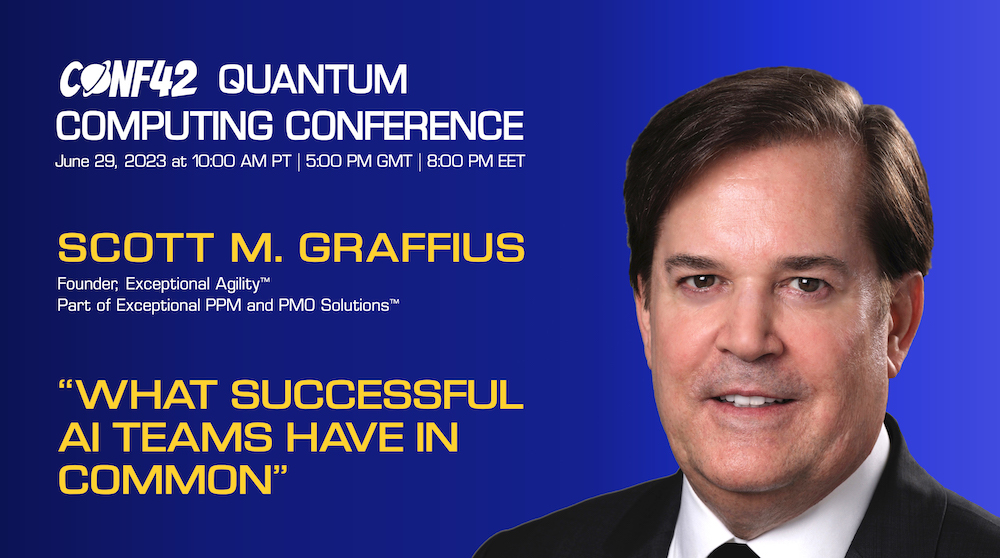
Scott M. Graffius has delivered 86 talks and workshops at conferences and other events across 25 countries. His newest engagement will be at the Conf42 Quantum Computing 2023 Conference, where he'll present “What Successful AI Teams Have in Common.” The talk draws from his work on AI projects as well as research from the Association for the Advancement of Artificial Intelligence, Google, IBM, IEEE, Microsoft, MIT, Software Engineering Institute, United States Artificial Intelligence Institute, and many others.
The conference also includes talks by:
- Daniel Goldsmith,
- Michal Jankowski,
- Trista Pan,
- Myron Giannakis,
- Peter Den Haan,
- Roberto Magnani,
- Sara Marzella, and
- Alberto García García.
Details ↴
📍 Watch the Quantum Computing Conference online
🗓 June 29, 2023 at 10:00 a.m. PT | 5:00 p.m. GMT | 8:00 p.m. EET
🎟 Subscribe to watch at: https://bit.ly/1-signup
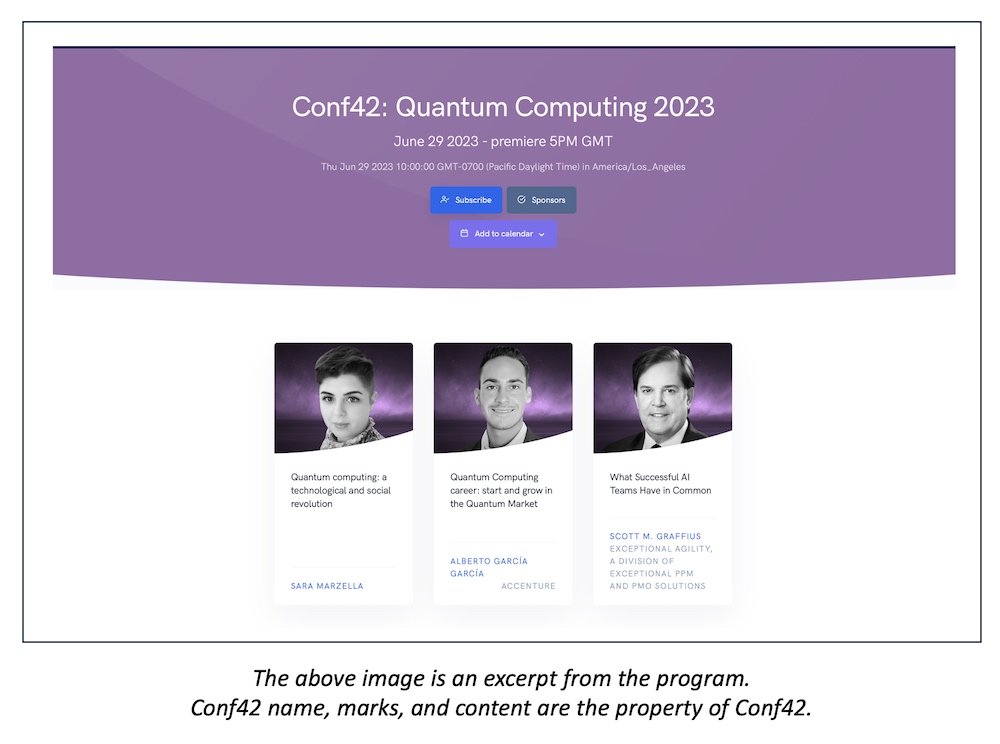



About Scott M. Graffius

Scott M. Graffius, PMP, SA, CSP-SM, CSP-PO, CSM, CSPO, SFE, ITIL, LSSGB is an agile project management practitioner, consultant, multi-award-winning author, and international keynote speaker. He is the Founder of Exceptional PPM and PMO Solutions™ and subsidiary Exceptional Agility™. He has generated over $1.9 billion of business value in aggregate for Global Fortune 500 businesses and other organizations he has served. Graffius and content from his books, talks, workshops, and more have been featured and used by businesses, professional associations, governments, and universities. Examples include Microsoft, Oracle, Broadcom, Cisco, Gartner, Project Management Institute, IEEE, Qantas, National Academy of Sciences, United States Department of Energy, New Zealand Ministry of Education, Yale University, Tufts University, and others. He has delighted audiences with dynamic and engaging talks and workshops on agile, project management, and technology (including AI) leadership at 86 conferences and other events across 25 countries.
His full bio is available here.
Connect with Scott on:


About Agile Scrum: Your Quick Start Guide with Step-by-Step Instructions

Shifting customer needs are common in today's marketplace. Businesses must be adaptive and responsive to change while delivering an exceptional customer experience to be competitive.
There are a variety of frameworks supporting the development of products and services, and most approaches fall into one of two broad categories: traditional or agile. Traditional practices such as waterfall engage sequential development, while agile involves iterative and incremental deliverables. Organizations are increasingly embracing agile to manage projects, and best meet their business needs of rapid response to change, fast delivery speed, and more.
With clear and easy to follow instructions, the multi award-winning Agile Scrum: Your Quick Start Guide with Step-by-Step Instructions book by Scott M. Graffius (Chris Hare and Colin Giffen, Technical Editors) helps the reader:
- Implement and use the most popular agile framework―Scrum;
- Deliver products in short cycles with rapid adaptation to change, fast time-to-market, and continuous improvement; and
- Support innovation and drive competitive advantage.
Hailed by Literary Titan as “the book highlights the versatility of Scrum beautifully.”
Winner of 17 first place awards.
Agile Scrum: Your Quick Start Guide with Step-by-Step Instructions is available in paperback and ebook/Kindle in the United States and around the world. Some links by country follow.
- 🇧🇷 Brazil
- 🇨🇦 Canada
- 🇨🇿 Czech Republic
- 🇩🇰 Denmark
- 🇫🇮 Finland
- 🇫🇷 France
- 🇩🇪 Germany
- 🇬🇷 Greece
- 🇭🇺 Hungary
- 🇮🇳 India
- 🇮🇪 Ireland
- 🇮🇱 Israel
- 🇮🇹 Italy
- 🇯🇵 Japan
- 🇱🇺 Luxembourg
- 🇲🇽 Mexico
- 🇳🇱 Netherlands
- 🇳🇿 New Zealand
- 🇳🇴 Norway
- 🇪🇸 Spain
- 🇸🇪 Sweden
- 🇨🇭 Switzerland
- 🇦🇪 UAE
- 🇬🇧 United Kingdom
- 🇺🇸 United States

About Agile Transformation: A Brief Story of How an Entertainment Company Developed New Capabilities and Unlocked Business Agility to Thrive in an Era of Rapid Change

Thriving in today's marketplace frequently depends on making a transformation to become more agile. Those successful in the transition enjoy faster delivery speed and ROI, higher satisfaction, continuous improvement, and additional benefits.
Based on actual events, Agile Transformation: A Brief Story of How an Entertainment Company Developed New Capabilities and Unlocked Business Agility to Thrive in an Era of Rapid Change provides a quick (60-90 minute) read about a successful agile transformation at a multinational entertainment and media company, told from the author's perspective as an agile coach.
The award-winning book by Scott M. Graffius is available in paperback and ebook/Kindle in the United States and around the world. Some links by country follow.
- 🇦🇺 Australia
- 🇦🇹 Austria
- 🇧🇷 Brazil
- 🇨🇦 Canada
- 🇨🇿 Czech Republic
- 🇩🇰 Denmark
- 🇫🇮 Finland
- 🇫🇷 France
- 🇩🇪 Germany
- 🇬🇷 Greece
- 🇮🇳 India
- 🇮🇪 Ireland
- 🇯🇵 Japan
- 🇱🇺 Luxembourg
- 🇲🇽 Mexico
- 🇳🇱 Netherlands
- 🇳🇿 New Zealand
- 🇪🇸 Spain
- 🇸🇪 Sweden
- 🇨🇭 Switzerland
- 🇦🇪 United Arab Emirates
- 🇬🇧 United Kingdom
- 🇺🇸 United States

The short URL for this article is: https://bit.ly/conf42
© Copyright 2023 Scott M. Graffius. All rights reserved. This material may not be published, broadcast, rewritten or redistributed without the express written permission of Scott M. Graffius.

Scott M. Graffius Speaking on Successful AI at DevDays Europe 2024 Conference
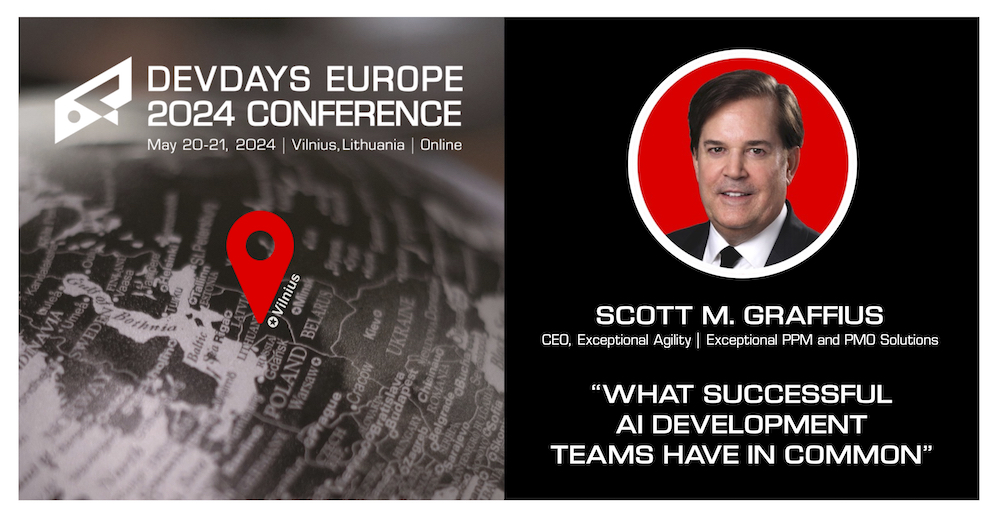
Agile leader, consultant, creator, multi-award-winning author, and international public speaker Scott M. Graffius delights audiences around the world with talks and workshops on AI, Innovation, Agile, Project Management, High Performance Teams, Video Game Development, Tech Leadership, Strategic Alignment, and more. He uses everyday language and vibrant custom visuals to make complex topics clear and understandable, and he provides audiences with practical information they can use. His sessions are highly rated by attendees and organizers alike.
Conference organizers, businesses, professional associations, government agencies, and universities around the world invite Scott to speak. He’s presented 89 talks and workshops at conferences and other events (public and private/corporate) across 25 countries.
Scott's newest engagement will be the DevDays Europe 2024 Conference, where he'll present “What Successful AI Development Teams Have in Common.” His talk draws from his work on AI projects as well as research from DARPA, Google, IBM, IEEE, Microsoft, Nvidia, Oracle, Software Engineering Institute, USAII, and other organizations.
💡 AI
ℹ️ https://bit.ly/dde2024
📍 Vilnius, Lithuania | Online
🗓 Tuesday, 21 May 2024
🕙 10:00 a.m. Eastern European Time
🎟 https://devdays.lt
About the DevDays Europe 2024 Conference
DevDays Europe brings together internationally recognized speakers and developers to encourage excellence and innovation in the software development community. The conference will cover emerging technologies and best practices in the software development industry — regardless of technological platform or language — without commercial hype. It will run from May 20-21, 23-24. Conference sessions will take place in the dynamic ambiance of movie theater halls at the Multikino Ozas (Multikino, Ozo str. 18, Vilnius, Lithuania). Visit https://devdays.lt to learn more.




About Scott M. Graffius

Scott M. Graffius, PMP, SA, CSP-SM, CSP-PO, CSM, CSPO, ITIL, LSSGB is an agile project management practitioner, consultant, thinker, creator, multi-award-winning author, and international public speaker. Founder and CEO of Exceptional PPM and PMO Solutions™ and subsidiary Exceptional Agility™, he has generated over $1.9 billion for Global Fortune 500 businesses and other organizations he has served. Graffius and content from his books, talks, workshops, and more have been featured and used by Microsoft, Oracle, Broadcom, Cisco, Gartner, Project Management Institute, IEEE, National Academy of Sciences, United States Department of Energy, Yale University, Tufts University, and others. He delights audiences with dynamic and engaging talks and workshops on agile project management, AI, Tech leadership, video game development, strategic alignment, the science of high performance teams, and more. To date, he's presented sessions at 89 conferences and other events across 25 countries.
His full bio is available here.
Connect with Scott on:
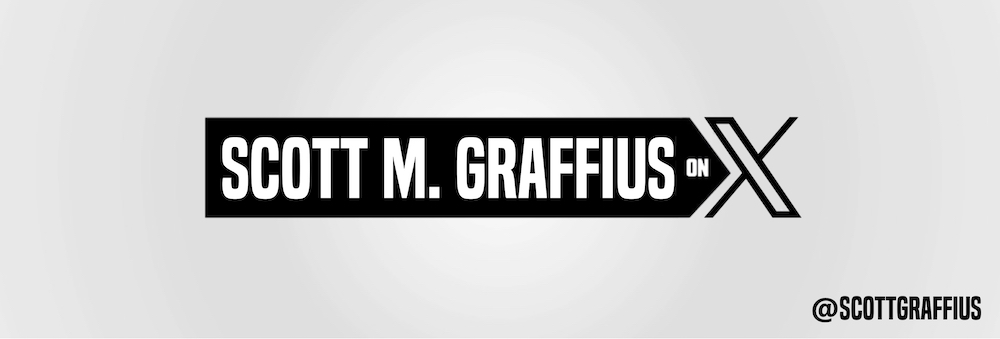
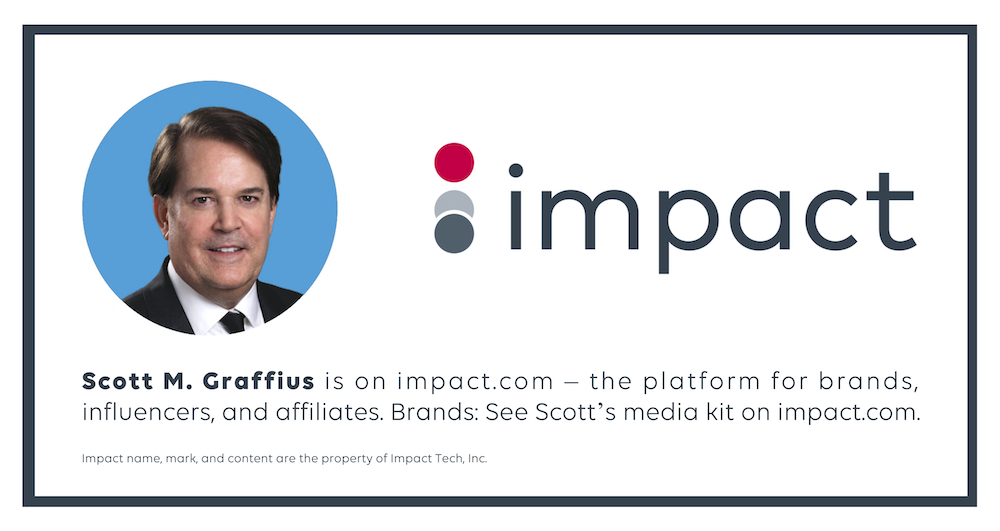

About Agile Scrum: Your Quick Start Guide with Step-by-Step Instructions

Shifting customer needs are common in today's marketplace. Businesses must be adaptive and responsive to change while delivering an exceptional customer experience to be competitive.
There are a variety of frameworks supporting the development of products and services, and most approaches fall into one of two broad categories: traditional or agile. Traditional practices such as waterfall engage sequential development, while agile involves iterative and incremental deliverables. Organizations are increasingly embracing agile to manage projects, and best meet their business needs of rapid response to change, fast delivery speed, and more.
With clear and easy to follow step-by-step instructions, Scott M. Graffius's award-winning Agile Scrum: Your Quick Start Guide with Step-by-Step Instructions helps the reader:
- Implement and use the most popular agile framework―Scrum;
- Deliver products in short cycles with rapid adaptation to change, fast time-to-market, and continuous improvement; and
- Support innovation and drive competitive advantage.
Hailed by Literary Titan as “the book highlights the versatility of Scrum beautifully.”
Winner of 17 first place awards.
Agile Scrum: Your Quick Start Guide with Step-by-Step Instructions is available in paperback and ebook/Kindle in the United States and around the world. Some links by country follow.
- 🇧🇷 Brazil
- 🇨🇦 Canada
- 🇨🇿 Czech Republic
- 🇩🇰 Denmark
- 🇫🇮 Finland
- 🇫🇷 France
- 🇩🇪 Germany
- 🇬🇷 Greece
- 🇭🇺 Hungary
- 🇮🇳 India
- 🇮🇪 Ireland
- 🇮🇱 Israel
- 🇮🇹 Italy
- 🇯🇵 Japan
- 🇱🇺 Luxembourg
- 🇲🇽 Mexico
- 🇳🇱 Netherlands
- 🇳🇿 New Zealand
- 🇳🇴 Norway
- 🇪🇸 Spain
- 🇸🇪 Sweden
- 🇨🇭 Switzerland
- 🇦🇪 UAE
- 🇬🇧 United Kingdom
- 🇺🇸 United States

About Agile Transformation: A Brief Story of How an Entertainment Company Developed New Capabilities and Unlocked Business Agility to Thrive in an Era of Rapid Change

Thriving in today's marketplace frequently depends on making a transformation to become more agile. Those successful in the transition enjoy faster delivery speed and ROI, higher satisfaction, continuous improvement, and additional benefits.
Based on actual events, Agile Transformation: A Brief Story of How an Entertainment Company Developed New Capabilities and Unlocked Business Agility to Thrive in an Era of Rapid Change provides a quick (60-90 minute) read about a successful agile transformation at a multinational entertainment and media company, told from the author's perspective as an agile coach.
The award-winning book by Scott M. Graffius is available in paperback and ebook/Kindle in the United States and around the world. Some links by country follow.
- 🇦🇺 Australia
- 🇦🇹 Austria
- 🇧🇷 Brazil
- 🇨🇦 Canada
- 🇨🇿 Czech Republic
- 🇩🇰 Denmark
- 🇫🇮 Finland
- 🇫🇷 France
- 🇩🇪 Germany
- 🇬🇷 Greece
- 🇮🇳 India
- 🇮🇪 Ireland
- 🇯🇵 Japan
- 🇱🇺 Luxembourg
- 🇲🇽 Mexico
- 🇳🇱 Netherlands
- 🇳🇿 New Zealand
- 🇪🇸 Spain
- 🇸🇪 Sweden
- 🇨🇭 Switzerland
- 🇦🇪 United Arab Emirates
- 🇬🇧 United Kingdom
- 🇺🇸 United States

Short link for this article: https://bit.ly/dev-ai
DOI: 10.13140/RG.2.2.24313.07529
© Copyright 2024 Scott M. Graffius. All rights reserved. This material may not be published, broadcast, rewritten or redistributed without the express written permission of Scott M. Graffius.

When Agile, AI, and Strategic Thinking Converge


Introduction
Agile, artificial intelligence (AI), and strategic thinking are essential for businesses to thrive in today’s fast-paced world. Each pillar stands on its own. Combined, the synergistic intersections of these pillars forge a powerful triad, capable of revolutionizing operations, supercharging performance, and delivering unprecedented results.
Agile is an iterative and incremental methodology. Agile approaches (such as Scrum and Kanban) help teams work in short cycles, rapidly adapt to change, and deliver products and services expeditiously.
AI adds a new dimension to adaptability. Leveraging vast datasets, AI can automate tasks, generate actionable insights (for smarter, faster decisions), and more.
Strategic thinking is about anticipating change and identifying opportunities. It helps individuals navigate complexities and achieve long-term goals. Strategic thinking centers on understanding the broader context. It considers market dynamics, competition, and internal capabilities. It ensures efforts align with a clear vision. While agile promotes adaptability and AI powers insights, strategic thinking ties everything together.
The Real Magic Happens When Agile, AI, and Strategic Thinking Converge
Here’s how the synergy plays out.
Agile Plus AI Provides Enhanced Agility with Intelligence
Agile combined with AI enables teams to work more effectively. For example, AI can analyze customer/user feedback and market data in real-time. This helps agile teams prioritize features or quickly pivot when needed.
AI also automates repetitive tasks. For example, it can handle some testing in software development. This frees teams to focus on innovation and higher-value work.
In addition, AI provides predictive insights. It helps improve sprint planning by anticipating challenges or uncovering opportunities. This helps teams stay one step ahead.
AI Plus Strategic Thinking Provides Data-Driven Strategy
AI and strategic thinking together create data-driven strategies. This empowers organizations to make informed and effective decisions.
AI provides precision at scale. It helps leaders analyze vast amounts of data, from market trends to user behavior. It assists them in crafting more impactful strategies.
AI’s predictive capabilities enhance scenario planning. Organizations can model potential outcomes and reduce uncertainty. This can provide a competitive edge.
Agile Plus Strategic Thinking Provides a Flexible Vision
Agile combined with strategic thinking creates a flexible vision. This helps organizations adapt and thrive in dynamic environments.
Agile methods allow strategies to evolve as real-world results emerge. Adaptable approaches replace rigid plans. This flexibility best positions businesses to respond effectively to new insights and changing conditions.
Agile also bridges the gap between execution and vision. It transforms ambitious goals into actionable steps; incremental progress aligns day-to-day efforts with long-term objectives.
Agile Plus AI Plus Strategic Thinking Provides Synergy at Its Best
When agile, AI, and strategic thinking converge, they create a powerful synergy. This drives a dynamic and adaptive approach to problem-solving and innovation.
Integrating AI into agile processes allows organizations to measure strategy effectiveness in real-time. They can make adjustments as needed, enabling real-time adaptive strategies.
This combination fosters a culture of fast-paced innovation. Agile frameworks and AI insights embed innovation into daily operations.
Strategic thinking ensures agility and AI are applied with purpose. It aligns efforts with long-term objectives. This provides resilience and better future-proofing in our ever-changing world.
Conclusion
Combining agile methodologies, AI technologies, and strategic thinking is not just advantageous—it's essential in today's rapidly evolving business landscape. Agile provides the framework to adapt quickly, AI augments decision-making with data-driven insights, and strategic thinking ensures a clear vision aligns these elements. Together, they create a synergistic system where responsiveness, innovation, and foresight form the foundation of sustainable success.

Read on for:
- Sources/References,
- About Scott M. Graffius,
- How to Cite This Article,
- and more.


References/Sources
Select bibliography:
- Atsmon, Yuval (2017, May 2). How to Unleash Your Strategic Thinking. Digital article. McKinsey & Company.
- Beall, Justin L. (2024, March 15). Revolutionizing Agile Ceremonies with OpenAI. Available at: https://dev.to/dev3l/revolutionizing-agile-ceremonies-with-openai-a-game-changer-in-software-development-177p.
- Berlin School of Business and Innovation (2022, September 22). How Do Technical Abilities Combined with Leadership Skills Fuel Career Growth? Available at: https://www.berlinsbi.com/blog/career-advice/how-do-technical-abilities-combined-with-leadership-skills-fuel-career-growth.
- Bonn, Ingrid (2005, June). Improving Strategic Thinking: A Multilevel Approach. Leadership & Organization Development Journal, 26 (5). DOI: 10.1108/01437730510607844.
- Defense Advanced Research Projects Agency (DARPA) (2024, September 27). Teaching AI What It Should and Shouldn’t Do. Available at: https://www.darpa.mil/news/2024/teaching-ai.
- Dixit, Avinash K., & Nelebuff, Barry J. (1993). Thinking Strategically: The Competitive Edge in Business, Politics, and Everyday Life. New York, NY: W. W. Norton & Company.
- Dolev, Niva, & Itzkovich, Yariv (2020). In the AI Era, Soft Skills are the New Hard Skills. In: Artificial Intelligence and Its Impact on Business, pp. 55-77. Charlotte, NC: Information Age Publishing.
- Engineering Research Visioning Alliance (n.d.). Strategic Thinking for Engineering Research in the Era of Artificial Intelligence. Available at: https://www.ervacommunity.org/task-force/visioning-event-strategic-thinking-for-engineering-research-in-the-era-of-ai/.
- Exceptional Agility (2023, April 10). What's the Future of Agile? Available at: https://exceptionalagility.com/blog/files/the-future.html.
- Goldman, Ellen F. (2007, Summer). Strategic Thinking at the Top. MIT Sloan Management Review, 48 (4): 75-81.
- Graffius, Scott M. (2016). Agile Scrum: Your Quick Start Guide with Step-by-Step Instructions. North Charleston, SC: CreateSpace.
- Graffius, Scott M. (2016). Thinking Strategically and Acting Tactically. Winnetka, CA: Exceptional PPM and PMO Solutions.
- Graffius, Scott M. (2018, October 18). Agile Scrum Helps Innovators, Disruptors, and Entrepreneurs Develop and Deliver Products at Astounding Speed Which Drives Competitive Advantage [Presentation]. Talk delivered at Techstars Startup Week Conference. DOI: 10.13140/RG.2.2.25009.12647.
- Graffius, Scott M. (2019). Agile Transformation: A Brief Story of How an Entertainment Company Developed New Capabilities and Unlocked Business Agility to Thrive in an Era of Rapid Change. Scotts Valley, CA: CreateSpace.
- Graffius, Scott M. (2020, October 16). Four Ways to Improve Your Strategic Thinking Skills Today. Available at: https://scottgraffius.com/blog/files/4-Strategic.html.
- Graffius, Scott M. (2023, May 1). AI is a Team Sport: A Confluence of Diverse Technical and Soft Skills are Crucial for Success. Available at: https://scottgraffius.com/blog/files/successful-ai-teams.html. DOI: 10.13140/RG.2.2.20321.79200.
- Graffius, Scott M. (2024, May 3). Leverage Agile and AI to Innovate at the Speed of Light. Talk at private event in Dubai, UAE. DOI: 10.13140/RG.2.2.30790.48960.
- Kerzner, Harold (2022). Innovation Project Management: Methods, Case Studies, and Tools for Managing Innovation Projects—Second Edition. Hoboken, New Jersey: Wiley.
- Kilby, Mark (2024, February 2). How AI Will Reshape Agile Development: Takeaways from a Recent Briefing. Agile Alliance. Available at: https://www.agilealliance.org/how-ai-will-reshape-agile-development-takeaways-from-a-recent-briefing/.
- Lang, Trudi, & Ramírez, Rafael (2023, October 11). How Ghost Scenarios Haunt Strategy Execution. MIT Sloan Management Review. Available at: https://sloanreview.mit.edu/article/how-ghost-scenarios-haunt-strategy-execution/.
- Lieberman, Marvin (2021, February). Is Competitive Advantage Intellectually Sustainable? Strategic Management Review, 2 (1): 29-46.
- Maneria, Sumitra, & Paikaray, Divya (2023). Artificial Intelligence and Agile Based Business Development Review. Third International Conference on Advance Computing and Innovative Technologies in Engineering (ICACITE), 2023, pp. 2091-2095. DOI: 10.1109/ICACITE57410.2023.10182756.
- Panesar, Gurpreet Singh, and Chadha, Raman, and Sharma, Ashim, and Tinna, Mandeep Singh, and Gupta, Anish, & Puri, Digvijay (2022). Atificial Intelligence in Business Development and Agile Software. Second International Conference on Advance Computing and Innovative Technologies in Engineering (ICACITE), 2022, pp. 306-311. DOI: 10.1109/ICACITE53722.2022.9823907.
- Reynolds, K. (2013). Strategic Thinking for Today's Project Managers. Paper presented at PMI Global Congress 2013—North America, New Orleans, LA. Newtown Square, PA: Project Management Institute.
- Schoemaker, Paul J. H. (1993, March). Multiple Scenario Development: Its Conceptual and Behavioral Foundation. Strategic Management Journal, 14 (3): 193-213.
- Steinberger, Tom, & Wiersema, Margarethe (2021). Data Models as Organizational Design: Coordinating Beyond Boundaries Using Artificial Intelligence. Strategic Management Review, 2 (1): 119-144.
- Syrett, Michael, & Devine, Marion (2012). Managing Uncertainty: Strategies for Surviving and Thriving in Turbulent Times. London, United Kingdom: Profile Books.
- Tallman, Stephen, and Shenkar, Oded, & Wu, Jay Valerian. (2023). Culture Eats Strategy for Breakfast: Use and Abuse of Culture in International Strategy Research. Strategic Management Review, 4 (2): 193-229.
- TechRepublic (2023, December 22). Crucial Skills Gaps in the UK Include AI and Strategic Thinking, According to Red Hat. Available at: https://www.techrepublic.com/article/red-hat-uk-tech-skills-gap-survey/.

About Scott M. Graffius

Scott M. Graffius sparks breakthroughs in AI, agile, and project management/PMO leadership as a globally recognized practitioner, researcher, thought leader, award-winning author, and international public speaker.
Graffius has generated more than USD $1.9 billion in business value for organizations served, including Fortune 500 companies. Businesses and industries range from technology (including R&D and AI) to entertainment, financial services, and healthcare, government, social media, and more.
Graffius leads the professional services firm Exceptional PPM and PMO Solutions, along with its subsidiary Exceptional Agility. These consultancies offer strategic and tactical advisory, training, embedded talent, and consulting services to public, private, and government sectors. They help organizations enhance their capabilities and results in agile, project management, program management, portfolio management, and PMO leadership, supporting innovation and driving competitive advantage. The consultancies confidently back services with a Delighted Client Guarantee™. Graffius is a former vice president of project management with a publicly traded provider of diverse consumer products and services over the Internet. Before that, he ran and supervised the delivery of projects and programs in public and private organizations with businesses ranging from e-commerce to advanced technology products and services, retail, manufacturing, entertainment, and more. He has experience with consumer, business, reseller, government, and international markets.
He is the author of two award-winning books.
- His first book, Agile Scrum: Your Quick Start Guide with Step-by-Step Instructions (ISBN-13: 9781533370242), received 17 awards.
- His second book is Agile Transformation: A Brief Story of How an Entertainment Company Developed New Capabilities and Unlocked Business Agility to Thrive in an Era of Rapid Change (ISBN-13: 9781072447962). BookAuthority named it one of the best Scrum books of all time.
Prominent businesses, professional associations, government agencies, and universities have featured Graffius and his work including content from his books, talks, workshops, and more. Select examples include:
- Adobe,
- American Management Association,
- Amsterdam Public Health Research Institute,
- Bayer,
- BMC Software,
- Boston University,
- Broadcom,
- Cisco,
- Coburg University of Applied Sciences and Arts Germany,
- Computer Weekly,
- Constructor University Germany,
- Data Governance Success,
- Deimos Aerospace,
- DevOps Institute,
- EU's European Commission,
- Ford Motor Company,
- GoDaddy,
- Harvard Medical School,
- Hasso Plattner Institute Germany,
- IEEE,
- Innovation Project Management,
- Johns Hopkins University,
- Journal of Neurosurgery,
- Lam Research (Semiconductors),
- Leadership Worthy,
- Life Sciences Trainers and Educators Network,
- London South Bank University,
- Microsoft,
- NASSCOM,
- National Academy of Sciences,
- New Zealand Government,
- Oracle,
- Pinterest Inc.,
- Project Management Institute,
- SANS Institute,
- SBG Neumark Germany,
- Singapore Institute of Technology,
- Torrens University Australia,
- TBS Switzerland,
- Tufts University,
- UC San Diego,
- UK Sports Institute,
- University of Galway Ireland,
- US Department of Energy,
- US National Park Service,
- US Tennis Association,
- Veleučilište u Rijeci Croatia,
- Verizon,
- Virginia Tech,
- Warsaw University of Technology,
- Wrike,
- Yale University,
- and many others.
Graffius has been actively involved with the Project Management Institute (PMI) in the development of professional standards. He was a member of the team which produced the Practice Standard for Work Breakdown Structures—Second Edition. Graffius was a contributor and reviewer of A Guide to the Project Management Body of Knowledge—Sixth Edition, The Standard for Program Management—Fourth Edition, and The Practice Standard for Project Estimating—Second Edition. He was also a subject matter expert reviewer of content for the PMI’s Congress. Beyond the PMI, Graffius also served as a member of the review team for two of the Scrum Alliance’s Global Scrum Gatherings.
Graffius has a bachelor’s degree in psychology with a focus in Human Factors. He holds eight professional certifications:
- Certified SAFe 6 Agilist (SA),
- Certified Scrum Professional - ScrumMaster (CSP-SM),
- Certified Scrum Professional - Product Owner (CSP-PO),
- Certified ScrumMaster (CSM),
- Certified Scrum Product Owner (CSPO),
- Project Management Professional (PMP),
- Lean Six Sigma Green Belt (LSSGB), and
- IT Service Management Foundation (ITIL).
He is an active member of the Scrum Alliance, the Project Management Institute (PMI), and the Institute of Electrical and Electronics Engineers (IEEE).
He divides his time between Los Angeles and Paris, France.
Thought Leader | Public Speaker | Agile Scrum Book | Agile Transformation Book | Blog | Photo | X | LinkedIn | Email


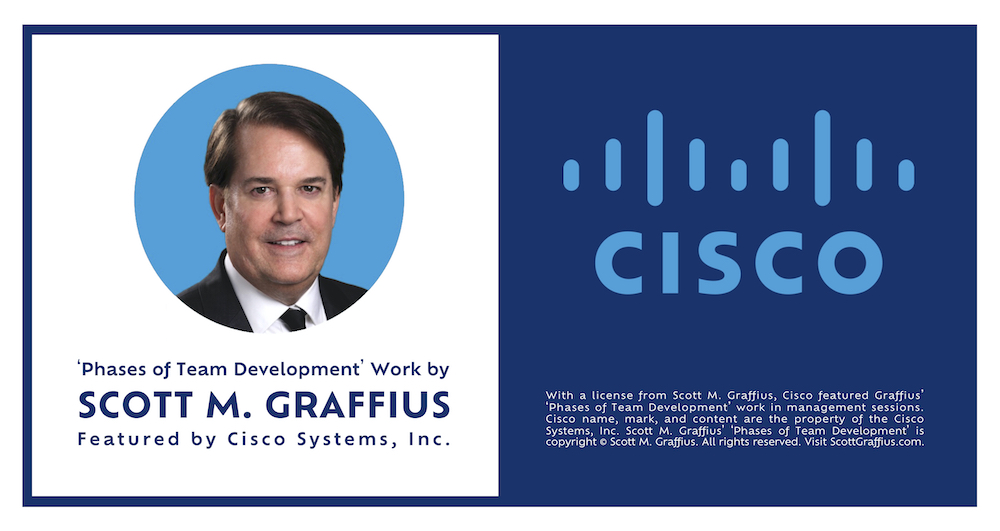










Sign up for Miro—it's free!
(Want more features? You can always upgrade to a paid plan.)


How to Cite This Article
Graffius, Scott M. (2025, January 24). When Agile, AI, and Strategic Thinking Converge. Available at: https://scottgraffius.com/blog/files/when-agile-ai-and-strategic-thinking-converge.html. 

Digital Object Identifier (DOI)
DOI: 10.13140/RG.2.2.22277.46565

Short Link for Article
The short link for this article is https://bit.ly/ai-agile

Copyright
Copyright © Scott M. Graffius. All rights reserved.
Content on this site—including text, images, videos, and data—may not be used for training or input into any artificial intelligence, machine learning, or automatized learning systems, or published, broadcast, rewritten, or redistributed without the express written permission of Scott M. Graffius.
